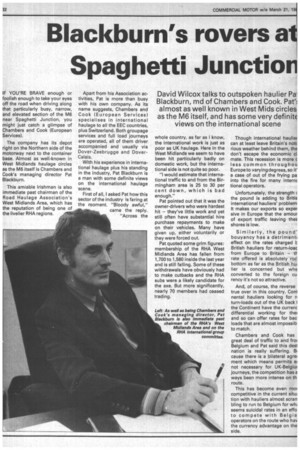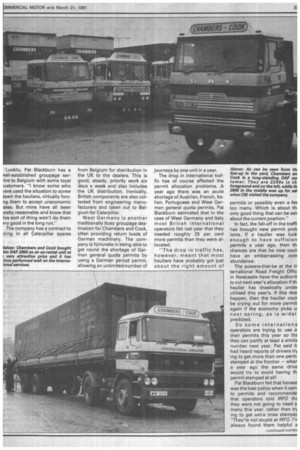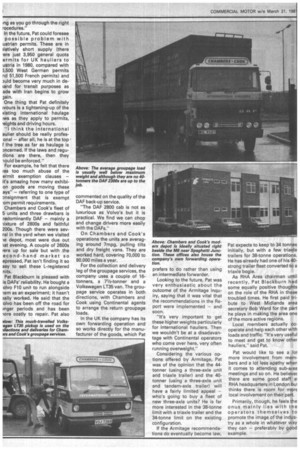Blackburn's rovers a Spaghetti Junctio
Page 34

Page 35

Page 36

If you've noticed an error in this article please click here to report it so we can fix it.
David Wilcox talks to outspoken haulier Pal Blackburn, md of Chambers and Cook. Pat': almost as well known in West Mids circles as the M6 itself, and has some very definitE views on the international scene
IF YOU'RE BRAVE enough or foolish enough to take your eyes off the road when driving along that particularly busy, narrow, and elevated section of the M6 near Spaghetti Junction, you might just catch a glimpse of Chambers and Cook (European Services), The company has its depot right on the Northern side of the motorway next to the container base. Almost as well-known in West Midlands haulage circles as the M6 itself is Chambers and Cook's managing director Pat Blackburn.
This amiable Irishman is also immediate past chairman of the Road Haulage Association's West Midlands Area, which has the reputation of being one of the livelier RHA regions. Apart from his Association activities, Pat is more than busy with his own company. As its name suggests, Chambers and Cook (European Services) specialises in international haulage to all the EEC countries, plus Switzerland. Both groupage services and full load journeys are operated, all of them driver accompanied and usually via Dover-Zeebrugge and DoverCalais.
With his experience in international haulage plus his standing in the industry, Pat Blackburn is a man with some definite views on the international haulage scene.
First of all, I asked Pat how this sector of the industry is faring at the moment. "Bloody awful," came the reply.
"Across the whole country. as far as I know, the international work is just as poor as UK haulage, Here in the West Midlands we seem to have been hit particularly badly on domestic work, but the international side is not quite so poor.
"I would estimate that international traffic to and from the Birmingham area is 25 to 30 per cent down, which is bad enough."
Pat pointed out that it was the owner-drivers who were hardest hit — they've little work and yet still often have substantial hire purchase repayments to make on their vehicles. Many have given up, either voluntarily or they were forced out.
Pat quoted some grim figures: membership of the RHA West Midlands Area has fallen from 1,700 to 1,580 inside the last year and is still falling. Some of these withdrawals have obviously had to make cutbacks and the RHA subs were a likely candidate for the axe. But more significantly, nearly 70 members had ceased trading. Though international haulier can at least leave Britain's not( rious weather behind them, the don't escape the economic cl mate. This recession is more c less common throughou Europe to varying degrees, so it' a case of out of the frying pa into the fire for many interim tional operators.
Unfortunately, the strength c the pound is adding to Britis international hauliers' problem: It makes our exports so exper sive in Europe that the amour of export traffic leaving thes shores is low.
Similarly, the pound' bouyancy has a detriment effect on the rates charged British hauliers for return-loac from Europe to Britain — tb rate offered is absolutely roc' bottom as far as the British hur lier is concerned but whe converted to the foreign cu rency it's not so attractive.
And, of course, the reverse true over in this country. Con1 nental hauliers looking for ri turn-loads out of the UK back 1 the Continent have the currenc differential working for ther and so can offer rates for bac loads that are almost impossib to match.
Chambers and Cook has great deal of traffic to and fro' Belgium and Pat said this des1 nation is really suffering. B1 cause there is a bilateral agrer ment which means permits au not necessary for UK-Belgiur journeys, the competition has a ways been more intense on th route.
This has become even mor competitive in the current situi tion with hauliers almost serer Wing to run to Belgium for whi seems suicidal rates in an effo to compete with Belgia operators on the route who hay the currency advantage on the side.
Luckily, Pat Blackburn has a veil-established groupage serrice to Belgium with some loyal :ustomers. "I know some who lave used the situation to screw iown the hauliers, virtually foreng them to accept uneconomic .ates. But mine have all been )retty reasonable and know that his sort of thing won't do them my good in the long run."
The company has a contract to ring in all Caterpillar spares from Belgium for distribution in the UK to the dealers. This is good, steady, priority work six clays a week and also includes the UK distribution. Ironically, British components are also collected from engineering manufacturers and taken out to Belgium for Caterpillar.
West Germany is another traditionally busy groupage destination for Chambers and Cook, often providing return loads of German machinery. The company is fortunate in being able to get round the shortage of German general quota permits by using a German period permit, allowing an unlimited number of journeys by one unit in a year.
The drop in international traffic has of course affected the permit allocation problems. A year ago there was an acute shortage of Austrian, French, Italian, Portuguese and West German general quota permits. Pat Blackburn estimated that in the case of West Germany and Italy most British international operators felt last year that they needed roughly 25 per cent more permits than they were allocated.
"The drop in traffic has, however, meant that most hauliers have probably got just about the right amount of permits or possibly even a fey too many. Which is about th, only good thing that can be sail about the current position."
In fact, the fall-off in the traffi has brought new permit prob lems. If a haulier was luck. enough to have sufficien permits a year ago, then th, chances are that he now coull have an embarrassing over abundance.
The powers-that-be at the In ternational Road Freight Offic• in Newcastle have the authorit to cut next year's allocation if th, haulier has drastically under utilised this year's. If this doe happen, then the haulier coul! be crying out for more permit again if the economy picks Li! next spring, as is widel predicted. •
So some internationa operators are trying to use a their permits this year so the they can justify at least a simila number next year. Pat said h had heard reports of drivers tr}. ing to get more than one perm stamped at the frontier — wher a year ago the same drive would try to avoid having th permit stamped at all!
Pat Blackburn felt that honest was the best policy when it cam to permits and recommende that operators told IRFO the. they were not going to need s many this year, rather than tr} ing to get extra ones stampec "They're not stupid at IRFO. l'y always found them helpful a
'rig as you go through the right rocedures."
In the future, Pat could foresee possible problem with ustrian permits. These are in )latively short supply (there 'ere just 3,950 general quota ermits for UK hauliers to ustria in 1980, compared with 3,500 West German permits nd 51,500 French permits) and )uld become very much in deland for transit purposes as ade with Iran begins to grow gain.
One thing that Pat definitely 'yours is a tightening-up of the Kisting international haulage Iws as they apply to permits, 'eights and driving hours.
"I think the international aulier should be really profesonal — after all, he is at the top I the tree as far as haulage is Decerned. If the laws and regurtions are there, then they lould be enforced."
For example, he felt that there ,as too much abuse of the ermit exemption clauses — it's amazing how many exhibion goods are moving these ays" — referring to one type of )nsignment that is exempt .om permit requirements.
Chambers and Cook's fleet of 5 units and three drawbars is redominantly DAF — mainly a lixture of 2800s and faithful 200s. Though there were sevral in the yard when we visited le depot, most were due out at evening. A couple of 2600s fere up for sale but with the econd-hand market so epressed, Pat isn't finding it so asy to sell these L-registered nits.
Pat Blackburn is pleased with is DAFs' reliability. He bought a olvo F10 unit to run alongside lem as an experiment; it hasn't 3ally worked. He said that the olvo has been off the road for )nger periods and has been lore costly to repair. Pat also commented on the quality of the DAF back-up service.
"The DAF 2800 cab is not as luxurious as Volvo's but it is practical. We find we can chop and change drivers more easily with the DAFs."
On Chambers and Cook's operations the units are averaging around 7mpg, pulling tilts and dry freight vans. They are worked hard, covering 70,000 to 80,000 miles a year.
For the collection and delivery leg of the groupage services, the company uses a couple of 16tonners, a 71/2-tonner and a Volkswagen LT35 van. The g roupage service operates in both directions, with Chambers and Cook using Continental agents to arrange the return groupage loads.
In the UK the company has its own forwarding operation and so works directly for the manufacturer of the goods, which Pat prefers to do rather than using an intermediate forwarder.
Looking to the future, Pat was very enthusiastic about the outcome of the Armitage Inquiry, saying that it was vital that the recommendations in the Report were implemented — and soon.
"It's very important to get these higher weights particularly for international hauliers. Then we wouldn't be at a disadavantage with Continental operators who come over here, very often running overweight."
Considering the various options offered by Armitage, Pat was of the opinion that the 44tonner (using a three-axle unit and triaxle trailer) and the 40tonner (using a three-axle unit and tandem-axle trailer) will have a fairly limited appeal — who's going to buy a fleet of new three-axle units? He is far more interested in the 38-tonne limit with a triaxle trailer and the 34-tonne limit on the existing configuration.
If the Armitage recommendations do eventually become law, Pat expects to keep to 34 tonnes initially, but with a few triaxle trailers for 38-tonne operations. He has already had one of his 40strong trailer fleet converted to a triaxle bogie.
As RHA Area chairman until recently, Pat Blackburn had some equally positive thoughts on the role of the RHA in these troubled times. He first paid tribute to West Midlands area secretary Bob Ward for the part he plays ih making the area one of the more active regions.
Local members actually cooperate and help each other with loads and traffic. "It's very useful to meet and get to know other hauliers," said Pat. .
Pat would like to see a lol more involvement from mem. bers and a lot less apathy when it comes to attending sub-area meetings and so on. He believer there are some good staff al RHA headquarters in London bui thinks there is room for mor€ local involvement on their part.
Primarily, though, he feels the onus mainly lies with the operators themselves to promote the image of the industry as a whole in whatever way they can — preferably by good example.












































































































